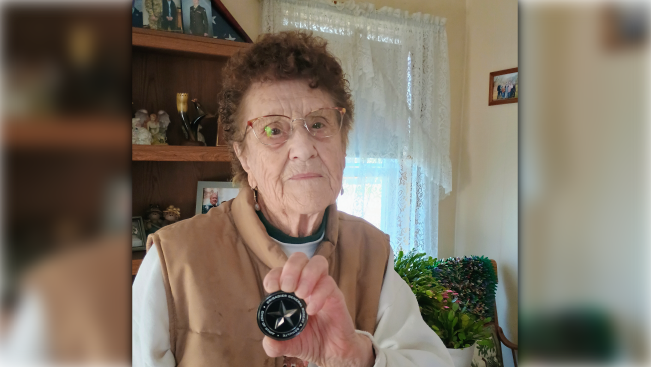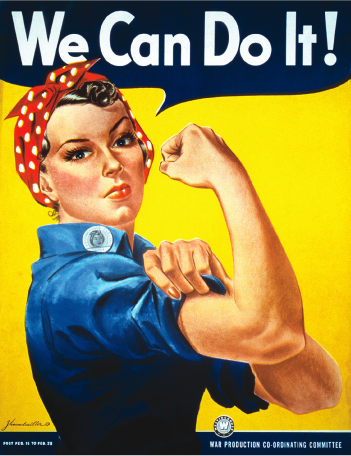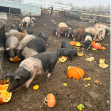
BEK Member Plays Role in Winning World War II
A True Rosie of the Heartland
November 2025
November is a time to give thanks for the harvest, for our blessings, and for those who’ve served our nation in times of war and peace. While not a veteran herself, 99-year-old Irene Sprague played a vital part in America’s victory during World War II as a Rosie the Riveter.
Born in 1926 on the Chmielewski family farm south of Tappen, Irene was a young teenager when World War II began. Her life was working on the farm with her eight siblings. There was no electricity or running water, and the bathroom was outdoors. But the world was changing fast, and so was Irene.
It was on that farm where Irene learned what hard work was. She says she was just five years old when she milked her first cow. “You get up in the morning, milk the cows, and get your morning chores done.” And that was before breakfast. “Everybody ate, and then they got on their horses and went out into the field,” she recalls. “Springtime, you got to get a crop in, and then you got to get your haying done. Then you got to harvest that grain when it’s ripe, and then comes threshing time.”
By 1942, as World War II was entering its third year, 16-year-old Irene was immune to what was happening off the farm. The family didn’t have a television, and she says she rarely listened to any news. Yet, she was very aware that something else was calling her. So, she and her sister-in-law packed their suitcases and left the prairie for Bremerton, Washington, where her older sister Gladys lived. “We just packed up and went to Seattle, got there on the train, had to walk to the ferry depot, and then get on a ferry for an hour to get over to Bremerton.”
Jobs were plentiful in Bremerton’s wartime shipyards because the men who worked them had been called to war. What Irene didn’t realize at the time was that millions of women, known as Rosie the Riveters, were working in defense industries across the nation as part of a war movement. “I thought that just us women in Bremerton were working. I didn’t know it was happening all over. It wasn’t until after the war ended that I heard of Rosie the Riveter.”
Irene was hired at the Puget Sound Naval Shipyard. “They asked what my skill was. I said, ‘I don’t have a skill.’ They asked what kind of work I do, and I said, ‘I just work!’” After explaining to her supervisors where North Dakota was and how she was able to survive on a farm with no electricity, running water, and below zero temperatures, she convinced them that farm life had taught her all she needed to know. So, they placed her in the machine shop making parts for water valves used in U.S. Navy vessels. “You had to file off the shavings so nothing would block the valve when it was in use. It better not dare leak one drop of water!”
Before long, her boss asked if she was ready to start using one of the pieces of equipment. “I told him that shouldn’t be a problem, but I also didn’t know what it was! I lied like hell because I didn’t know what I was doing!” But she learned quickly and produced thousands of gaskets for Navy ships, work that quite literally helped keep America’s fleet afloat.
Only six months later, in April 1943, a letter from home changed everything. “Mom wrote that I had to come home because my brother Louis was sick in the hospital,” Irene said. “Dad had eight quarters of land and rented two more. You couldn’t hire a man because everyone was in the service. Mama said, ‘Irene, come home.’”
Returning to North Dakota, Irene found herself back in the barn milking 25 to 30 cows by hand. Four of Irene’s brothers were drafted into service, fighting in Europe and the Pacific. “When my brothers came home, they talked a bit about the war and this Rosie the Riveter thing,” she says. “But I still didn’t know who Rosie the Riveter was. To me, I went out there, did a job, and I loved my job.” She eventually got married and had three sons of her own. “I remember hearing how some women were upset that when the boys came home from war, they were let loose because the men had to take over the jobs again. That’s when I put it together.”
Today, Irene acknowledges the larger meaning of her work. “If it wasn’t for the Rosies, we may never have won that war,” she reflects. “Women all across the country did their part, and I’m proud I was one of them, even if I didn’t know it then.”
Irene now lives in Steele. She has two sons still living, seven grandchildren, and generations of great- and great-great-grandchildren. In 2022, she received a Medal of Excellence from Brigadier General Robert A. Schulte of the North Dakota Air National Guard in recognition of her contribution to America’s war effort.
As she approaches her 100th birthday this spring, Irene reflects with gratitude and humility. “When I stop and think of what I did in my 99 years, I wonder how the hell I got it all done,” she said with a laugh. “You just did what needed doing. That’s how we were raised.”
This November, as we give thanks to and honor our veterans, BEK Communications Cooperative salutes Irene Sprague, a true Rosie of the Heartland, whose hard work, courage, and quiet service helped build a stronger America.
About Rosie the Riveter:
Women Played Crucial Role in Helping to Win the War

A National Icon
“Rosie the Riveter” became a symbol of the six million American women who worked in factories and shipyards during World War II, proving that women could do vital industrial work once reserved for men. Rosies built airplanes, tanks, and ships, making parts, riveting metal, and assembling engines that powered Allied victory.
The name came from a 1942 song, "Rosie the Riveter", and soon inspired posters, magazine covers, and recruitment campaigns. The iconic “We Can Do It!” image by artist J. Howard Miller was created in 1943 to boost morale among female workers.
Further Reading:
In Her Own Words
Life on the Farm…
“The blades needed to be sharpened on the plow, so Dad would take them into town and come back and tell me to put them back on the plow, and you just did it and went back to plowing. You just did what Dad said to do! I thought I was so big because I got to mow with the boys! And when that was done, well it had to be raked and then it had to be stacked. I was in seventh heaven because I got to work with the boys at 10 years old!”
“My four brothers were making stuff all the time when I was a little kid. There was a lot of stuff you couldn’t buy back then, and they made it! They made snow planes that had an airplane engine in it and a big propeller behind it. They made all that, and I was right there with them. I loved it!”
“I was 13, and Joe taught me how to drive. One day Mom and Dad went to town and took the cream and the eggs and had to get parts for the machines, and Joey says let’s drive. So, in my Dad’s big 1929 ton and a half truck, we went up the hill a half a mile, turn around and come back, and then around in a circle for about 45 minutes when Mama was coming home and Joe says, ‘We better quit!’”
On Getting Her First Job…
“First thing they asked me, do you have a social security card? I said no. I didn’t know what that was. Well, you have to have one to apply! I said I’m not going all the way back to North Dakota to get one. They said they could get me one there.”
“I didn’t have a skill. I was 16 years old and grew up on a farm! I told them about milking cows, haying, and threshing. They sat there and looked at me and asked what threshing was. So, I told them, and then I tell them you got to get ready for Winter, and all that hay is pitched by hand because we don’t have electricity or running water on the farm. I told them we don’t even have running bathrooms in the house. And they ask, well where do you go to the bathroom then? And I says you go in the outhouse. What’s an outhouse? You almost had to draw them a picture! Then they ask, well how did you survive? And where is North Dakota?”
On Learning Factory Work…
“The first thing they made me do was assemble water valves, from little ones to big ones. In fact, there was two great big ones they reeled in with a cherry picker, and the parts for each one were in a cart, and we had to put them together.”
“My boss says here’s the pile for this and that for that. It was gaskets to go for three different sized valves that we were working on because that’s what we had to hook them on when we got them done to pressurize them. I got one batch done, and then I go to the boss and said, ‘What now?’ And he said, ‘You don’t have it done yet.’ And I said, ‘Well go look!’ So, then I set the machines up for another size, and I cut out another couple thousand.”
On Coming Home to the Farm…
“I had four brothers in the service, all drafted within a month. Stanley was an Officer’s cook, Ed was in the tank division and came home shell-shocked, Joe was in the Air Force and came home a bit shell-shocked too, and Tony was in heavy artillery. Louis, the youngest of the brothers, never served because he had medical problems.”
“The day I got home, Louis was just out of the hospital. Mama had supper ready, so we ate, I changed my clothes, and I went out to the barn to milk.”
“When my supervisors couldn’t figure out how we could live without electricity or running water, I told them we were pioneers. And we were better off than when Mother and Dad came to homestead. There was nothing. No trees, no fences, nothing. My Dad immigrated from Poland in 1910. My mother was born in Philadelphia to Polish immigrants.”












